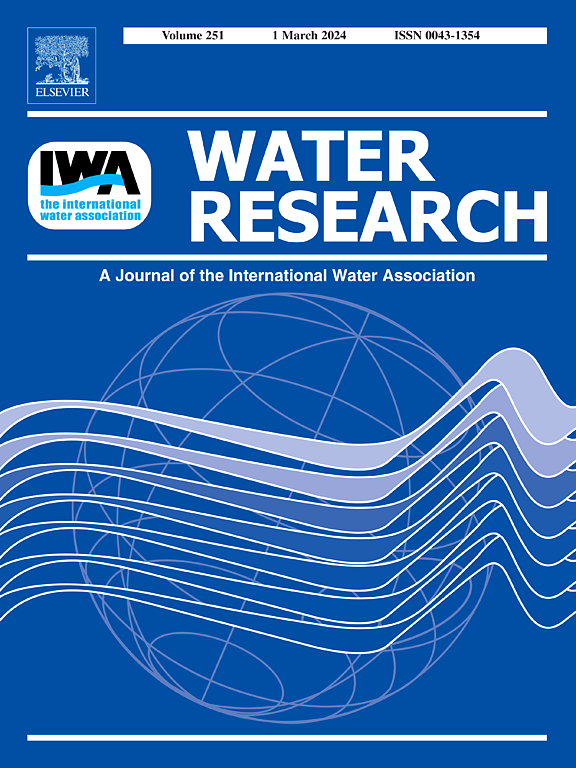Integration of metagenomic analysis and metabolic modeling reveals microbial interactions in activated sludge systems in response to nanoplastics and plasticizers
IF 11.4
1区 环境科学与生态学
Q1 ENGINEERING, ENVIRONMENTAL
引用次数: 0
Abstract
Nanoplastics and plasticizers are prevalent in activated sludge and pose a potential threat to microbial communities in wastewater treatment systems. However, studies on the effects of nanoplastics and plasticizers on the interaction mechanisms and metabolic functions of microbial communities in activated sludge systems are still scarce. In this study, the responses of microbial interactions and metabolic functions to PVC nanoplastics (PVC-NPs) and bis(2-ethylhexyl) phthalate (DEHP) in activated sludge were investigated via a combination of amplicon sequencing, metagenome sequencing, and metabolic modeling. The results revealed that DEHP had a significant effect on the microbial community under short-term exposure. DEHP contamination may increase vitamin B12 producers to enhance species collaboration in communities. Furthermore, community metabolic modeling revealed that DEHP-degrading bacteria could promote positive interactions among community members. The increased metabolic exchange flux of siderophores and glutathione in microbial communities under PVC-NPs and DEHP contamination implied that microbial communities may maintain iron homeostasis in response to PVC-NPs and DEHP contamination through interspecies collaboration. However, more data are needed to further validate these results. This study provides vital insights into the response mechanisms of microbial interactions to nanoplastic and plasticizer contamination in activated sludge systems.整合元基因组分析和代谢模型,揭示活性污泥系统中微生物对纳米塑料和增塑剂的相互作用
纳米塑料和增塑剂普遍存在于活性污泥中,对废水处理系统中的微生物群落构成潜在威胁。然而,有关纳米塑料和增塑剂对活性污泥系统中微生物群落的相互作用机制和代谢功能影响的研究仍然很少。本研究结合扩增子测序、元基因组测序和代谢模型,研究了活性污泥中微生物群落对聚氯乙烯纳米塑料(PVC-NPs)和邻苯二甲酸二(2-乙基己酯)(DEHP)的相互作用和代谢功能的响应。研究结果表明,在短期暴露条件下,DEHP 对微生物群落有显著影响。DEHP 污染可能会增加维生素 B12 的产生,从而加强群落中的物种协作。此外,群落代谢模型显示,DEHP降解菌可促进群落成员之间的良性互动。在 PVC-NPs 和 DEHP 污染下,微生物群落中嗜苷酸盐和谷胱甘肽的代谢交换通量增加,这意味着微生物群落可能会通过种间协作来维持铁的平衡,以应对 PVC-NPs 和 DEHP 污染。然而,还需要更多数据来进一步验证这些结果。本研究为活性污泥系统中微生物相互作用对纳米塑料和增塑剂污染的响应机制提供了重要见解。
本文章由计算机程序翻译,如有差异,请以英文原文为准。
求助全文
约1分钟内获得全文
求助全文
来源期刊

Water Research
环境科学-工程:环境
CiteScore
20.80
自引率
9.40%
发文量
1307
审稿时长
38 days
期刊介绍:
Water Research, along with its open access companion journal Water Research X, serves as a platform for publishing original research papers covering various aspects of the science and technology related to the anthropogenic water cycle, water quality, and its management worldwide. The audience targeted by the journal comprises biologists, chemical engineers, chemists, civil engineers, environmental engineers, limnologists, and microbiologists. The scope of the journal include:
•Treatment processes for water and wastewaters (municipal, agricultural, industrial, and on-site treatment), including resource recovery and residuals management;
•Urban hydrology including sewer systems, stormwater management, and green infrastructure;
•Drinking water treatment and distribution;
•Potable and non-potable water reuse;
•Sanitation, public health, and risk assessment;
•Anaerobic digestion, solid and hazardous waste management, including source characterization and the effects and control of leachates and gaseous emissions;
•Contaminants (chemical, microbial, anthropogenic particles such as nanoparticles or microplastics) and related water quality sensing, monitoring, fate, and assessment;
•Anthropogenic impacts on inland, tidal, coastal and urban waters, focusing on surface and ground waters, and point and non-point sources of pollution;
•Environmental restoration, linked to surface water, groundwater and groundwater remediation;
•Analysis of the interfaces between sediments and water, and between water and atmosphere, focusing specifically on anthropogenic impacts;
•Mathematical modelling, systems analysis, machine learning, and beneficial use of big data related to the anthropogenic water cycle;
•Socio-economic, policy, and regulations studies.
 求助内容:
求助内容: 应助结果提醒方式:
应助结果提醒方式:


